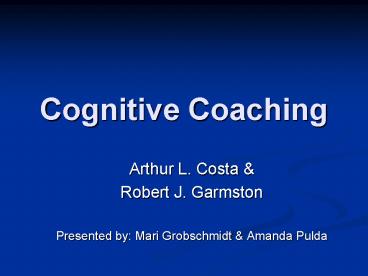Cognitive Coaching PowerPoint PPT Presentation
1 / 19
Title: Cognitive Coaching
1
Cognitive Coaching
- Arthur L. Costa
- Robert J. Garmston
- Presented by Mari Grobschmidt Amanda Pulda
2
Objectives
- Outline the principles pertaining to cognitive
coaching - Connect mentoring coaching
- Highlight tools mentors/mediators/coaches can use
to facilitate cognitive growth - Develop and maintain trust
- Emphasize useful sections of the text
3
Book Overview
- Discovering the Meanings of Cognitive Coaching
- Sources of Excellence
- Engaging in Coaching
- Integrating Cognitive Coaching Throughout the
System
4
A Snapshot of Cognitive Coaching
5 States of Mind Tools for disciplined choice
making
- Self development of personal efficacy
requires mastery of knowledge and skills,
attainable only through long hours of arduous
work. - -A. Bandura (p. 126)
Efficacy
5
Destiny is as destiny does. If you believe that
you have no control, then you have no control.
-W. Roberts. (p. 129)
Flexibility
6
Learn to do uncommon things in an uncommon
manner. Learn to do things so thoroughly that no
one can improve upon what has been done.
-B. T. Washington (p. 132)
Craftsmanship
7
The White people think the whole body is
controlled by the brain. We have a word,
umbelini (the whole intestines) that is what
controls the body. My umbelini tells me what is
going to happen have you never experienced it?
-M.
Tiso (Xhosa Tribe, South Africa)
Consciousness
8
Weve each been invited to this present moment
by design. Our lives are joined together like
the tiles of a mosaic none of us contributes the
whole of the picture, but each of us is necessary
for its completion.
-K. Casey M.Vanceberg
(p. 138)
Interdependence
9
We all have the extraordinary coded within us,
waiting to be released.
-J. Houston (p. 124)
Within you right now is the power to do things
you never dreamed possible. This power becomes
available to you just as you can change your
beliefs.
-M. Malts (p. 142)
10
What do we want __________________ to be able to
do?
11
Goals of Cognitive Coaching
- Colleagues are encouraged to
- Inquire
- Speculate
- Construct Meanings
- Self-evaluate
- Self-prescribe
12
The Mediators Toolkit
- Paralanguage
- Response Behaviors
- Structuring
- Mediative Questioning
13
Paralanguage
- Nonverbal Verbal Cues
- Posture
- Gesture
- Inflection
- Pitch
- Volume
- Rate of Speech
- Language Choices
- Breathing
14
Response Behaviors
- Silence (wait longer than you think you need to)
- Communicates respect
- Results in positive effect on cognitive
processing - Acknowledging (give verbal nonverbal cues)
- Communicates that ideas have been heard
- Paraphrasing (stems)
- Acknowledge Clarify
- Summarize Organize
- Shift Focus
- Clarifying
- Providing Data Resources
15
Structuring
- A coach clearly communicates expectations about
purposes and the use of such resources as time,
space, and materials. - Should be based on a common understanding of the
purposes for the coaching, the roles the coach
should play, time allotments, and placement of
the coach during observation.
16
Mediative Questioning
Its not the answers that enlighten us, but the
questions.
- Intentionally designed to engage and transform
thinking and perspective. - Questions must meet three criteria
- Invitational in intonation and form
- Engage specific complex cognitive processes
- Address content that is either external or
internal to the other person.
17
Questioning Feedback Toolbox
- Planning Conversation
- Observation
- Reflecting Conversation
18
Conclusions
- Model conferences
- Leading questions
- Language cues movement
- Possible research questions
- Renaissance Schools
19
References
- Costa, A. L. Garmston, R. J. (2002).
Cognitive coaching A foundation for renaissance
schools. Norwood, MA Christopher-Gordon
Publishers, Inc.

